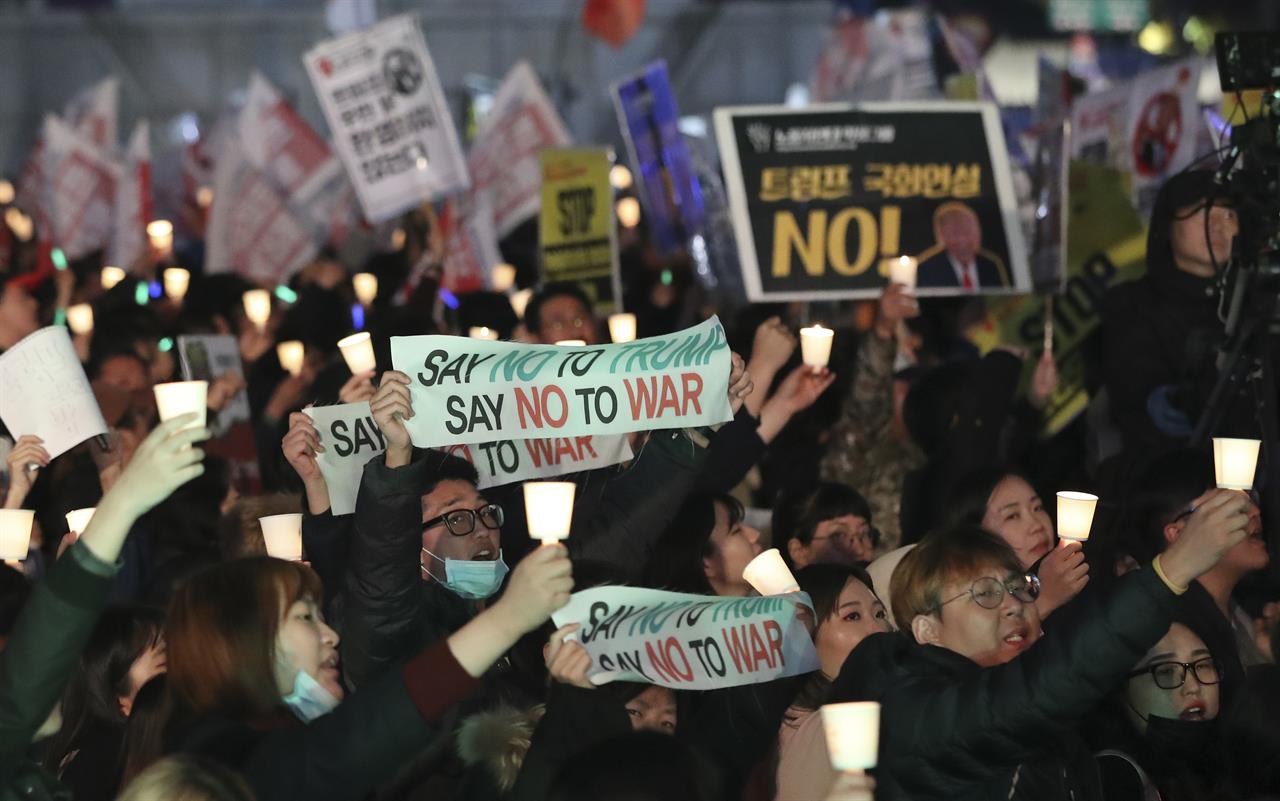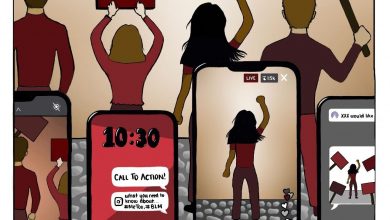The North Korea Question

Image by Lee Jin-Man via AP Photo
Beyond the racist caricatures of the Kim family, the fabricated claims that there exist fake buildings in Pyongyang to fool tourists, and the claims that there’s a strict selection of haircuts one can receive, over 25 million people reside in the Democratic People’s Republic of Korea (DPRK). It is a country that bears the history of colonialism and ceaseless economic chokeholds. As tensions between the U.S. empire and the small indigenous nation of North Korea grow higher in these past few weeks than in the past several decades, it is imperative that those residing in the belly of the imperial beast change the dialogue surrounding the Korean peninsula.
Although the U.S. media condemns the DPRK and its leaders for being provocative, unpredictable and aggressive, the historical basis of the DPRK’s actions is rarely discussed. The Korean War is glossed over in U.S. history classes, but the U.S.’s involvement in Korea is essential for understanding the DPRK. Following the end of Japanese occupation, an artificial border was constructed along the 38th parallel that distinguished the North by famine and the South by U.S. military occupation.
In 1948, the DPRK was formed by the Worker’s Party of Korea, whose leadership had majority support for leading the struggle against Japanese colonialism. Kim Il-Sung was a guerilla fighter for Korean liberation. Meanwhile, the formation of the Republic of Korea (ROK), or South Korea, involved UN installment of anti-communists in government who had ties to Japanese imperialists. Syngman Rhee, the first president of the ROK and president during the Korean war, was a brutal anti-communist who purged tens of thousands of leftists in the South while forgiving the Korean elites who had either served or collaborated with Japanese colonists.
The recently ousted ex-president of ROK, Park Geun-Hye, was the daughter of President Park Chung-Hee who served in the Japanese Imperial Army. Park Geun-Hye was impeached for being heavily influenced by a cult leader, Choi Soon-Il, as well as her imposition of unpopular anti-labor, pro-Japanese business policies and her inaction in response to the Sewol Ferry disaster. This impeachment came after millions of South Koreans protested every week for 5 months in what’s been called the Candlelight Revolution, which continues as a movement towards peace, Korean sovereignty and progressive ideals.
Although citizens seized power from Park Geun-Hye, the new president, Moon Jae-In continues to collaborate with the U.S. despite what the people want for Korea. Currently, elders in the small village of Seongju have been protesting Moon’s deployment of THAAD (Terminal High Altitude Area Defense), a U.S. missile defense system. Resistance to foreign involvement has been an ongoing struggle within the ROK since its formation out of the Korean war.
The Gwangju Uprising of 1980, a student-led movement in the city of Gwangju against martial law, serves as an essential piece of historical resistance against the oppressive military dictatorship. This movement inspired the June Struggle of 1987 that formally ended military dictatorship. However, 30 years later, U.S. troops are still stationed all over South Korea. Many of those living in Seongju remember the devastating effects of the Korean war vividly and moved to rural Seongju in an attempt to live a quiet life. They wish for U.S. troops to leave because they see U.S. involvement as the primary obstacle to peace in Korea.
It is essential to listen to local voices of resistance when attempting to understand the politics of a nation. The citizens of the DPRK have been particularly silenced by imperial powers, as most of the dialogue surrounding Korea ignores its ongoing relationship to these powers. Foreigners who travel to the DPRK are humbly asked by its citizens to recognize Korea’s history before forming an opinion on their country’s defense policies. Those fighting for labor rights in the ROK have continually been met with silencing tactics as well. Members of the left in South Korea are often imprisoned for political activity. A new labor party, the People’s Party, only emerged recently after Park Geun-Hye formally disbanded the previous labor party and serves as a continuation of the Candlelight Movement.
The public correspondence between Donald Trump and Kim Jong-Un has raised concerns that reopening the Korean war is very possible. Liberal pundits in corporate media now talk as if war is inevitable and emphasize that Kim Jong-Un is inconsolable. The UN consistently slaps sanctions against the DPRK to punish them for nuclear arms buildup. However, despite the fear-mongering raised by the U.S., the DPRK has historically never attacked nor invaded another country, and holds a strict no-first-strike policy. The DPRK’s defense policy has even been called “remarkably consistent” by Dennis Blair, the former U.S. Director of National Intelligence.
Pressure on the DPRK to destroy its weapons programs comes from the U.S., a country with over 100 times the number of nuclear weapons that the DPRK has. Although global nuclear freeze would be ideal, the DPRK is in no position to dismantle its weapons. When Libyan leader Muammar Gaddafi voluntarily destroyed his weapons of mass destruction, it cleared the path for U.S. invasion. The DPRK’s nuclear deterrents are one of the only lines of defense against a relentless empire that already killed 1/5th of the Korean population during the Korean War. The Pentagon recently issued a statement proposing a possible ground invasion of North Korea, which would mean an overt provocation from the U.S. These next few weeks, we’ll see a normalization of these sorts of statements to set the stage for an invasion.
As the natural growth of capitalism requires the expansion of its reach into the pockets of other nations, it is essential for those opposing the system of imperialism to defend the nations under attack. Orientalist, unsubstantiated peculiarities about the DPRK allow Americans to dehumanize North Koreans; the further they are from being perceived as people, the easier it is to be complicit in the bombing of those people. The U.S. has never addressed the massacre it has committed, as American history classes are relatively silent on what’s been dubbed the “Forgotten War.” The direction of the U.S. under Trump only indicates war crimes like the Sinchon Massacre could occur again, with even less regard for human life.
Patriarchy, imperialism, racism, and classism are all structured by capitalism. Imperialism exists as the highest stage of capitalism. It imposes the most extreme and brutal conditions upon oppressed nations, which are often invisible to those living in the heart of the empire. It is important for us to re-evaluate our perception of the DPRK and unpack the propaganda levied against it. Many defectors from North Korea are bribed to construct gruesome and fantastic depictions of the DPRK which are often recanted by the defectors themselves. None of this is to say that the DPRK is not flawed. However, the chauvinistic narrative that justifies imperialist intervention and genocidal war in the country needs to change.




